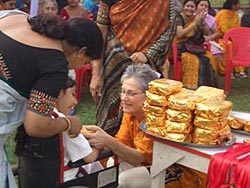Diane Bryen uses Fulbright to help people with disabilities in India
| For 16 years, Diane Bryen has been changing lives through her work with Temple’s Institute on Disabilities. Her efforts have brought about positive personal changes not only at Temple, but also around the world. In January, Bryen embarked on a journey to Kolkata (formerly Calcutta), India, on a Fulbright Senior Scholar grant. Bryen spent three weeks at the Indian Institute on Cerebral Palsy, a center with which she established contacts through her affiliation with the International Society for Augmentative and Alternative Communication. While in Kolkata, she led a series of lectures and workshops titled “Daring to Dream,” which helps participants identify their goals and establish a vision for their future. |
 Photo courtesy Diane Bryen
Diane Bryen, director of the Institute on Disabilities, traveled to the Indian Institute on Cerebral Palsy in Kolkata to deliver a series of workshops on “Daring to Dream” to people with significant disabilities. She was named the chief guest of the institute’s annual Sports Day, and was given the opportunity to present awards to participants.
|
|
The workshops were geared toward people with significant disabilities, although family members, professionals and staff also attended. The “Daring to Dream” process is a part of the Institute on Disabilities’ Augmentative Communication and Empowerment Supports — known as ACES — that was founded in 1987. Bryen said the people she met in Kolkata were “most open and most interested in learning. There was a passion for stretching themselves and having a commitment to change and to build India and build Kolkata.” Bryen also noted that the “power of the Fulbright” is realized when one travels abroad and does as much learning as teaching. Bryen was so inspired by the staff at the Indian Institute on Cerebral Palsy that she hopes to bring a representative to Temple. She will also be conducting collaborative research titled “Engendering Digital Independence,” which illustrates what underserved communities can do when given access to the Internet. Bryen added that one of her dreams is to see a Fulbright-like exchange of people with disabilities who are leaders in their community. “We all have so much to learn from each other about self advocacy,” she said. Bryen, who has visited India three times, added that once someone is accepted into the roster of the Fulbright Senior Scholar program, they remain there for five years, which means she may get another opportunity to travel courtesy of the Fulbright. She hopes to be matched with Sochni’it, an Arab teachers’ college in Israel, as it is one of the few such colleges that teaches about inclusive education practices. “I do a lot of international work and have a lot of international colleagues,” said Bryen, who has traveled to Israel and South Africa and left for Australia on March 3. “I conduct seminars and workshops around the nation and the world, but there’s been a theme throughout: supporting people with the most significant disabilities to develop their own voice with the goal of promoting self-advocacy and disability rights.” Bryen, who earned a Ph.D. from Temple in educational psychology in 1973, joined the faculty that year and began work at the Institute on Disabilities in 1991.
|
|